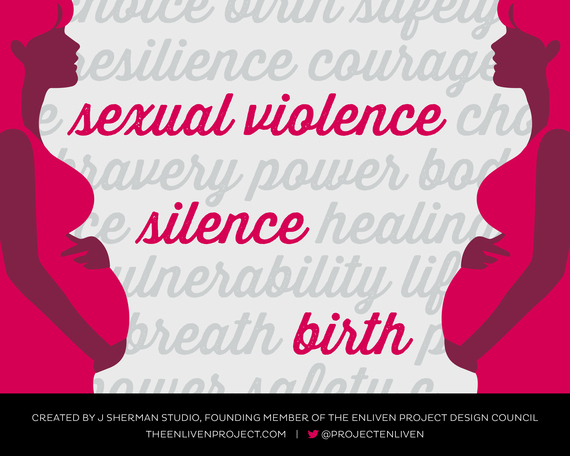Before I got pregnant, it never occurred to me that labor and childbirth could re-trigger sexual trauma for me in such significant ways. As a survivor of sexual violence, I had more than 20 years of healing and recovery under my belt. But I was still completely unprepared for the ways in which birth -- and the silence around it -- would open so many old wounds in new ways.
Overall, pregnancy, labor and delivery were unlike any other experiences in my body or in my life. The energy I usually had available to manage my anxieties and emotions was being used in other ways, leaving me less resilient to new trauma. It required me to face new sensations that were scary and uncomfortable. On the one hand, it's an amazing experience to create life and to feel your heart open to a new human. On the other hand, many of the sensations are at the "scene of the crime," which made them triggering for me as a survivor.
Some triggers took me by surprise and some didn't. Sure, I was able to predict that unannounced vaginal exams might cause me anxiety, so I managed that by asking my health care providers to go slow, explain what they were doing and be as gentle as possible. Yet I wasn't triggered at all by being partially or fully naked in front of health care providers. The moment that did cause a panic attack was having an oxygen mask placed over my nose and mouth in the operating room before a c-section. This feeling brought back visceral memories of being held down while assaulted, complete with the message that I should just relax and everything would be OK.
Throughout labor and delivery, being heard was central to me feeling safe and secure during a necessarily chaotic and unpredictable process. In the experience of sexual violence, I lost my voice, and in labor, I lost it again. During my daughter's birth, I was afraid that the epidural I received during labor wasn't working properly and might not provide pain coverage for an unplanned c-section. The OB brushed me off, telling me not to worry about it. Later, in the operating room, I felt the initial incision. Instead of following up, apologizing or even acknowledging this, she minimized my experience after the surgery, saying, "See, that wasn't so bad, was it?"
A simple moment of listening can illuminate an otherwise terrifying experience. For example, my son's birth required a true emergency c-section when his heart rate plummeted for more than 10 minutes. Even in the midst of this true crisis, the OB took 15 seconds to explain to me what was happening, get my consent and reassure me that future births might be very different. In the aftermath of that traumatic birth experience, I held onto that moment for many months, and it helped me recover.
Sexual assault is having your body taken from you without your consent. Oftentimes, medical events feel the same way. During both deliveries, it sometimes felt like things were being done to my body without my permission. There is a big difference between asking for consent -- and waiting for it to be given -- and informing someone a millisecond before doing something, even though emergency situations may require moving quickly.
In the wake of the birth of my second -- and last -- child, I've reflected on the advice I wish someone had given to me that was more grounded in the messiness of birth and experience of being a survivor of sexual trauma:
1. Whatever feelings come up, remember they are normal. No matter what happens, there is nothing wrong with you or your body -- whether you baby is positioned for a vaginal birth, you need a c-section or you choose pain management. And whether you feel joy, sadness, fear or anxiety during labor and birth, your feelings are totally normal.
2. Manage for anxiety, not for pain. Most childbirth preparation classes teach you techniques to manage pain through mindfulness, breath, hypnosis, etc. I used the same techniques, but focused on my anxiety. When it reached a certain level, the pain became a distraction from managing anxiety, and therefore presence of mind. I chose an epidural for my second labor so that I could rest, process what was happening, and speak up if necessary.
3. Raise the issue of sexual violence with your health care providers. I told my health care providers about my sexual assault history, which sometimes felt scary at first, but opened the door for some important conversations about my care. We also hired a doula for our second birth, and having a support person helped us manage emotions, communicate and stay grounded throughout a long labor. Whether a doula, friend or trusted family member, don't be afraid to ask for extra help.
4. Talk to a counselor at a rape crisis center or call a hotline. Even if your assault happened years ago, you might need new support to get through a new experience. I met with a social worker at the hospital throughout my pregnancy to help prepare, and she has been a great support after delivery as well.
I'm wonderfully grateful for my children, and would do it all over again to have them in my life. But I hope that by telling the truth about trauma and birth, other survivor moms can be more prepared than I was for all of the emotions that birth can bring.
This post reflects the personal views of Sarah Beaulieu and does not reflect the views of any organization she represents. For more resources on birth trauma and sexual violence, please visit The Enliven Project.
